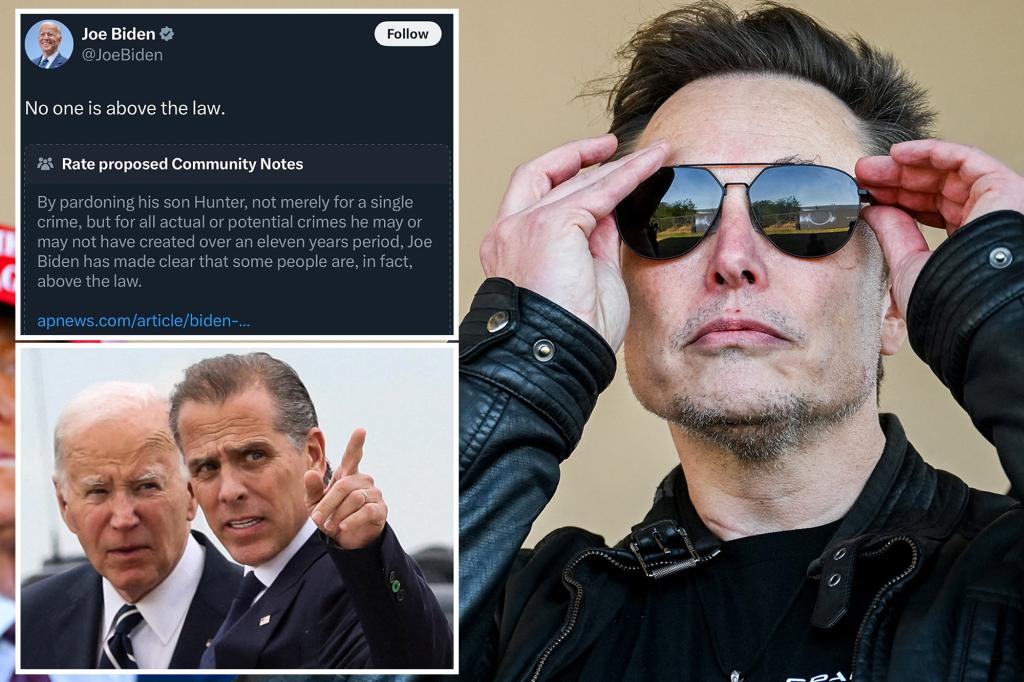Elon Musk has publicly criticized President Biden for what he perceives as hypocrisy following the president’s decision to pardon his son, Hunter Biden. Musk’s remarks highlight a particular tweet from Biden, in which he asserted that “no one is above the law.” This declaration gained traction once Biden announced the pardon for Hunter, who has been embroiled in various legal troubles. Musk and others on social media seized the moment to point out the apparent contradiction between Biden’s past assertions about accountability and the pardoning of his son, thereby sparking widespread debate on the issue.
The specifics of the pardon are notable; it covers a broad range of offenses potentially spanning an eleven-year period from 2014 to 2024. Musk shared a stark interpretation of the pardon, suggesting that it serves as evidence that some individuals, namely the President’s son, are indeed above the law. This sentiment was captured in Musk’s commentary posted to his millions of followers on X (formerly Twitter), as he expressed this view with the phrase “Community Notes slays,” referencing the platform’s feature for user-generated fact-checking. His emphasis on the magnitude of the pardon underscored the perception of a privileged status enjoyed by Hunter Biden due to his familial connection.
Hunter Biden has faced significant legal challenges, having pleaded guilty to nine counts related to tax fraud, amounting to $1.4 million, and has also been found guilty of gun-related offenses stemming from his possession of a firearm while reportedly struggling with addiction. This pattern of legal issues has fueled discussions about fairness in the judicial process and the extent to which Hunter’s status as the president’s son influenced the handling of his case. President Biden’s rationale for the pardon centers on the claim that Hunter had been unfairly targeted due to his familial ties, a sentiment echoed in Biden’s recent statements asserting that his son was “singled out.”
The President stated that individuals with similar backgrounds, like Hunter’s, typically do not face such severe legal repercussions, especially when they take corrective actions like paying back taxes along with interests and penalties. Biden’s argument implies that Hunter’s experiences with the law were not only unique but disproportionately punitive, highlighting a struggle with drug abuse and recovery. He lamented the broader implications of this scrutiny on both his son and himself, suggesting a continual assault on their personal lives and character.
Furthermore, Biden’s emotional appeal reflects a father’s desire to protect his child from perceived unjust treatment. He characterized the campaign against Hunter as an attempt to destabilize their family, urging that “enough is enough.” Biden’s narrative framed the pardon as not merely a personal favor to his son but as a stand against what he considers an ongoing vendetta against them, reiterating Hunter’s recovery journey and portraying a sense of paternal defense in the face of relentless scrutiny.
The implementation of the community notes feature on X allows users to contribute to fact-checking efforts, a new approach to managing misinformation. This tool has become central to discussions surrounding Biden’s pardon, as users actively engage in assessing and critiquing statements made by high-profile figures. Musk’s utilization of this feature underscores how online platforms are increasingly shaping public discourse, especially concerning critical political matters like pardons and legal accountability, showcasing the dynamic and complex nature of contemporary political narratives.










